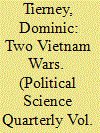| Srl | Item |
| 1 |
ID:
139947


|
|
|
|
|
| Publication |
Princeton, Princeton University Press, 1981.
|
| Description |
xxxi, 606p.: ill., figures, tables, abbre.pbk
|
| Standard Number |
0691101132
|
|
|
|
|
|
|
|
|
|
|
|
Copies: C:1/I:0,R:0,Q:0
Circulation
| Accession# | Call# | Current Location | Status | Policy | Location |
| 019890 | 951.9042/CUM 019890 | Main | On Shelf | General | |
|
|
|
|
| 2 |
ID:
163357


|
|
|
|
|
| Summary/Abstract |
HOW DO AMERICANS PERCEIVE AND UNDERSTAND WAR? Dominic Tierney contended that Americans tend to favor interstate wars and support escalation for decisive victory (the “crusade” mind‐set), whereas they oppose nation‐building and counterinsurgency missions in the midst of a civil war and usually view the outcome as a failure (the “quagmire” mind‐set).
The Vietnam War is a valuable case for exploring this claim because the conflict could be perceived as either an interstate war or a civil war. “No question in the entire debate over Vietnam was more hotly disputed than this one,” wrote David Levy, “because both sides could see that the moral authority of the undertaking depended directly upon what was believed.”2 Tierney's theory predicts that Americans who saw the mission primarily as an interstate war will have adopted the crusade mind‐set with a number of positive associated beliefs, including higher levels of support. Meanwhile, Americans who saw the campaign primarily as a civil war will have adopted the quagmire mind‐set with a number of negative associated beliefs, including lower levels of support. In other words, people are expected to have looked at the same essential set of facts about blood and treasure expended but reached very different conclusions depending on which frame they highlighted.
|
|
|
|
|
|
|
|
|
|
|
|
|
|
|
|